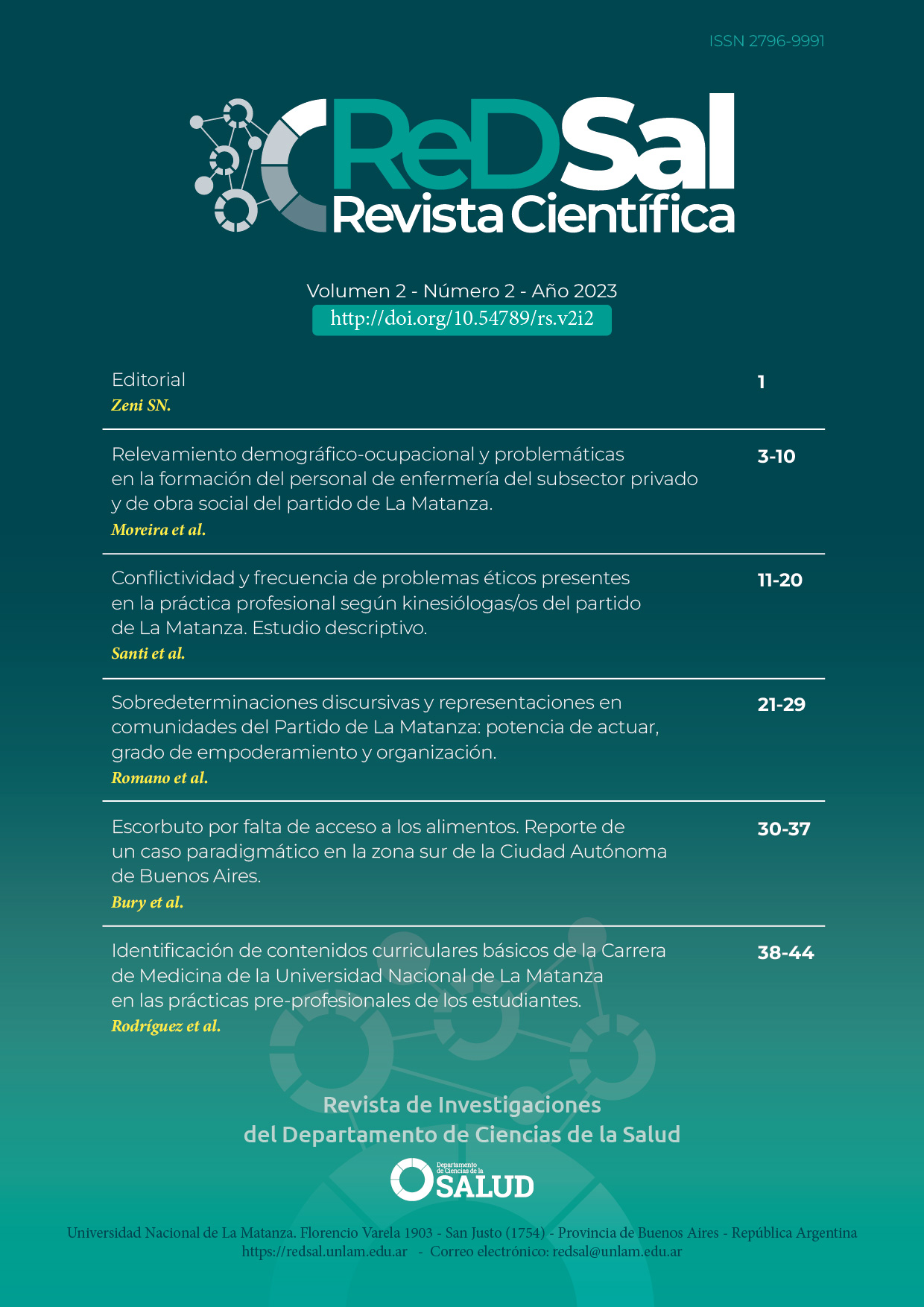Contentiousness and frequency of ethical problems in professional practice according to physical therapists from La Matanza district. Descriptive study.
DOI:
https://doi.org/10.54789/rs.v2i2.25Keywords:
bioethics , kinesiology applied, physical therapy modalities, professional-patient relations, professional ethics, ArgentinaAbstract
Objective: to characterize the ethical problems that arise in the practice of physical therapy according to physical therapists who work in La Matanza district.
Materials and methods: A descriptive, observational and cross-sectional study was carried out, with a non-probabilistic, intentional sampling. The population consisted of professionals enrolled in the Colegio de Kinesiólogos de la Provincia de Buenos Aires. A structured questionnaire was designed and distributed through digital media. Data
collection was carried out between December 2021 and April 2022. The survey was anonymous and self-administered and inquired into five axes. Only the results for axis 5 (types of ethical problems) were included in this paper,
and 5 problematic scenarios (S) were found. Questions included the degree of conflict and frequency perceived in each scenario.
Results: All the situations presented were perceived as very problematic or somewhat problematic; and perceived as very frequent or frequent. S 3, 4 and 5 were considered the most problematic and frequent. S 1 was perceived as the least problematic.
Conclusions: Ethical problems related to work dynamics,
institutional practices, and the availability of resources were considered the most problematic and frequent. Those linked to the physical therapist-patient relationship were considered the least problematic, though frequent.
References
Internet Encyclopedia of Philosophy [sede web]. Knoxville Tenesse, Estados Unidos: Gordon JS; 2012 [Acceso 9 de agosto de 2023]. Bioethics [1-24] Disponible en: http://www.iep.utm.edu/bioethic/
Purtilo RB. Understanding ethical issues: the physical therapist as ethicist. Phys Ther. 1974; 54:239–242. https://doi.org/10.1093/ptj/54.3.239
Purtilo RB. Ethics teaching in allied health fields. Hastings Cent Rep. 1978; 8(2):14–16. https://doi.org/10.2307/3560399
Swisher LL. A retrospective analysis of ethics knowledge in physical therapy (1970-2000). Phys Ther. 2002 Jul;82(7):692-706. PMID: 12088466. https://pubmed.ncbi.nlm.nih.gov/12088466/
Ricci Fuentes MV. San Martín Ramírez V. Dilemas éticos en el quehacer kinésico. Revista Ciencias de la Actividad Física. 2013;14(2): 47-54. ISSN: 0717-408X. https://www.redalyc.org/articulo.oa?id=525657741006
Delany CM, Edwards I, Jensen GM, Skinner E. Closing the gap between ethics knowledge and practice through active engagement: An applied model of physical therapy ethics. Phys Ther. 2010;90(7):1068–78. http://ipts.org.il/_uploads/dbsattachedfiles/closingthegap.pdf
Guccione AA. Ethical issues in physical therapy practice: a survey of physical therapists in New England. Phys Ther. 1980; 60:1264–1272. https://doi.org/10.1093/ptj/60.10.1264
Triezenberg HL. The identification of ethical issues in physical therapy practice. Phys Ther. 1996 Oct;76(10):1097-107. https://doi.org/10.1093/ptj/76.10.1097. PMID: 8863763.
Carpenter C, Richardson B. Ethics knowledge in physical therapy: a narrative review of the literature since 2000. Phys Ther. 2008;13:366–374. https://doi.org/10.1179/174328808X356393
Díaz Narváez VP, Salas Alarcón D, Bracho Milic F y Ocaranza Ozímica J. Empatía en estudiantes de Kinesiología. Universidad Mayor, sede Temuco, Chile. Revista Ciencias de la Salud. 2015;13(3):383-393. ISSN: 1692-7273. https://www.redalyc.org/articulo.oa?id=56242524006
Robinovich Benadof J, Morales Manriquez K, Oppliger Quinteros W, Arriagada López A. Formación en ética de los estudiantes de la carrera de Kinesiología de la universidad de la frontera. En: Correa FJL, Editor. Docencia de la bioética en Latinoamérica: experiencias y valores compartidos. 1a ed. Santiago de Chile: Felaibe; 2011.p. 219-224.
Eveleigh RM, Muskens E, van Ravesteijn H, van Dijk I, van Rijswijk E, Lucassen P. An overview of 19 instruments assessing the doctor-patient relationship: different models or concepts are used. J Clin Epidemiol. 2012;65(1):10–5. https://doi.org/10.1016/j.jclinepi.2011.05.011
Nalette E. Constrained Physical Therapist Practice: An Ethical Case Analysis of Recommending Discharge Placement From the Acute Care Setting, Phys Ther. 2010;90(6): 939-952. https://doi.org/10.2522/ptj.20050399
Greenfield BH, Anderson A, Cox B, Tanner MC. Meaning of caring to 7 novice physical therapists during their first year of clinical practice. Phys Ther. 2008; 88:1154–1166. https://doi.org/10.2522/ptj.20070339
Purtilo RB. Whom to treat first, and how much is enough? Ethical dilemmas that physical therapists confront as they compare individual patients' needs for treatment. Int J Technol Assess Health Care. 1992 Winter;8(1):26-34. https://doi.org/10.1017/s0266462300007881. PMID: 1601590.
Delany CM. In private practice, informed consent is interpreted as providing explanations rather than offering choices: a qualitative study. Aust J Physiother. 2007;53(3):171-7. https://doi.org/10.1016/s0004-9514(07)70024-7. PMID: 17725474.
Swisher LL, Page C. Professionalism in physical therapy: history, practice. 1era. edición. Londres, Inglaterra: Saunders; 2005.
Salles A. La relación médico-paciente. En: Luna F, Salles A, editores. Bioética: Nuevas reflexiones sobre debates clásicos. Buenos Aires: Fondo de Cultura Económico; 2008. p. 137– 164.
Delany CM. Respecting patient autonomy and obtaining their informed consent: ethical theory—missing in action. Physiotherapy. 2005;91:197–203. http://dx.doi.org/10.1016/j.physio.2005.05.002
Gabard DL, Martin MW. Physical therapy ethics. 2da. ed. Filadelfia: McGraw Hill; 2011.
American Physical Therapy Association [Sede web]. Alexandria: American Physical Therapy Association, 2020 [Acceso 9 de agosto de 2023]. Code of ethics for the physical therapist [1-3]. Disponible en: https://www.apta.org/apta-and-you/leadership-and-governance/policies/code-of-ethics-for-the-physical-therapist
Colegio de kinesiólogos de la Provincia de Buenos Aires [sede Web]. La Plata: Colegio de kinesiólogos de la Provincia de Buenos Aires, 2017 [Acceso 9 de agosto de 2023]. Consentimiento informado [1]. Disponible en: https://autogestion.cokiba.org.ar/pdf/consentimiento_informado.pdf
Swisher LL, Royeen CB. Rehabilitation ethics for interprofessional practice. Sudbury, MA, Estados Unidos de América: Jones and Bartlett; 2019.
Triezenberg HL, Davis CM. Beyond the code of ethics: Educating physical therapists for their role as moral agents. J Phys Ther Educ. 2000;14(3):48–58. https://doi.org/10.1097/00001416-200010000-00009
Poulis I. Bioethics and physiotherapy. J Med Ethics. 2007; 33:435–436. https://doi.org/10.1136%2Fjme.2007.021139

Downloads
Published
How to Cite
Issue
Section
License
Copyright (c) 2023 ReDSal

This work is licensed under a Creative Commons Attribution 4.0 International License.


